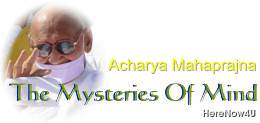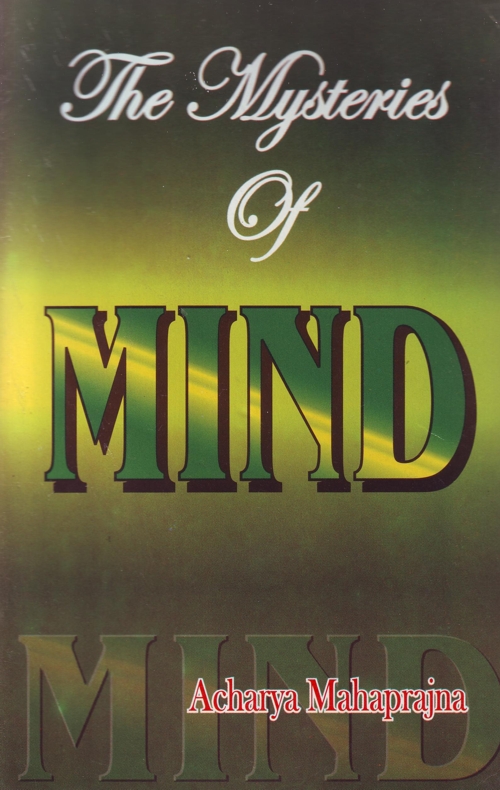
- The practitioner has to fight a battle against the enemies, which lie within himself.
- The battle begins after the practitioner has declared a truce between himself and the external forces of the enemy,
- The battle between Bharata and Bahubali was a battle between the forces of delusion and those of consciousness.
- Bahubali was a practitioner of sadhana but Bharata was not.
- The power of Preksa.
- Preksa is a struggle to look deep within.
- A knowledge of strategy and tactics leads to success.
- Sraddha means will or pull.
- Combination of sraddha and dedication.
- Dedication begins with the declaration: I seek shelter in the Arihamta, I seek shelter in the siddhas (emancipated souls), I seek shelter in the sadhus, I seek shelter in the discipline taught by the kevalis (souls possessing pure knowledge).
- Obstructions in sadhana - delusion, idleness, laziness.
- Ten and ten make sixty - this is blind faith.
- Ten and ten make twenty - this is knowledge.
- Four guidelines of success - valour, will, dedication and devotion to truth.
We have begun the search for truth. It is the greatest pursuit of life. Among all the living beings man alone is capable of this search. He alone has a highly developed brain, glands and centres of supersensual knowledge. That is the reason why he alone is capable of the search for truth. It is encouraging to note that he is conscious of his powers and has consciously engaged himself in the search for truth because he is the embodiment of truth and knowledge.
Bhagavan Mahavira said, "Search Truth Yourself." Our search is a twofold search; it is a search for Truth and it is a search for the Self. The Truth we search cannot be put to any use by anybody else except by ourselves. The world of the spirit is different from the temporal world. In the world of the spirit he alone who searches for Truth can put it to use and enjoy supreme bliss obtained from self-realization. There is a saying: "He alone who searches for Truth can obtain it." He who does not search for it shall never get it.
The achievements of scientific researches are put to practical use for the entire society. Achievements of spiritual exertion, on the other hand, are the personal achievement of him who has exerted himself. Others cannot derive any benefit from them. These achievements may be described in language, but, unless one has exerted himself, he can not derive any benefit from the descriptions. One has to walk alone on the road, which leads to Truth and self-realization. Successful practitioners of sadhana have tried to communicate their experiences to others who have derived some benefit from them, but not much. Spiritual experiences cannot be transferred to others. Every one has to exert himself independently to gain them. Whatever has been spoken or written by those who gained spiritual experiences became sruti or written or spoken literature, which can be understood, interpreted or discussed, by theoreticians, but it could not and can not lead anybody to direct experience. Spiritual experiences are not social experiences, but personal experiences gained by personal exertion. Of course, Sruti is useful because it prepares the background for sadhana. But this background serves no purpose unless the practitioner has exerted himself. Unless he has personally entered into these experiences, he cannot say whether they are true or false. He will have to stand on his own legs. It is no use citing the Agamas or the Gita or the Grantha Sahab or the Koran or the Bible to prove that spiritual experiences are genuine experiences and reveal truth. Mere intellectual conviction is not experience. Unless a theory has been translated into practice through experiments, it cannot yield any tangible results. It is only he who has experienced truth can say 'this is truth and I have known, perceived and experienced it.
The field of self-search is also a field of scientific research. Every practitioner will have to think and exert himself scientifically. There is no other way to acertain Truth. Whatever truth or truths Acarya Tulasi has discovered cannot be claimed by his followers as their discoveries. They will have to gain their own experiences in their own way. They cannot borrow them from their preceptor. The search for truth is a long and complicated process of scientific experiments. To say 'search truth' is not enough. Mahavira added the word 'yourself to this exhortation. He amended it thus: 'Search truth yourself.'
It may very well be said that there is no laboratory for experiments in the search for truth. It is true that we need a well-equipped laboratory for this search. The human body is the biggest laboratory in the world. No scientist has at his disposal such a huge laboratory. It is a well-equipped laboratory. It has all kinds of equipments for the search for the self. It contains the finest gadgets and instruments like microwaves, electronic instruments of high frequency, etc. These are self-propelled units. But as they have been lying idle, they have become rusted. It is our job to remove their rust and to utilize them. They are capable of revealing truth.
 Acharya Mahaprajna
Acharya Mahaprajna

